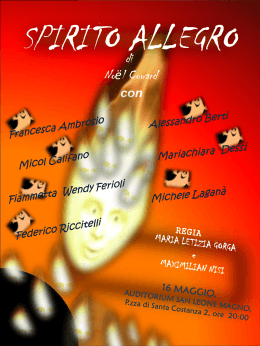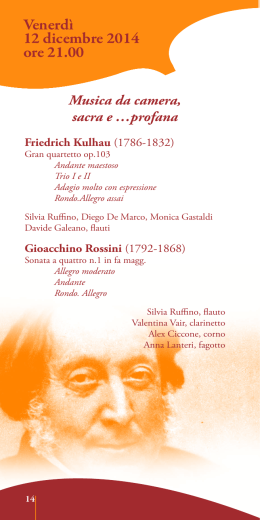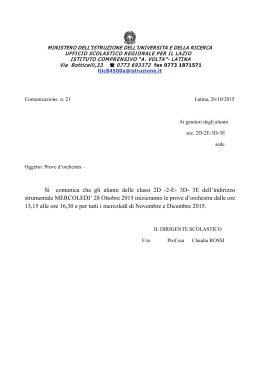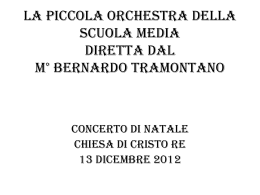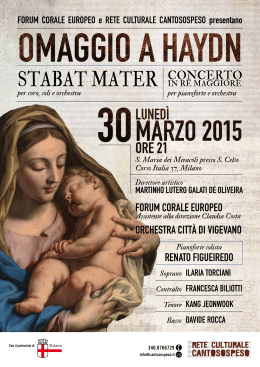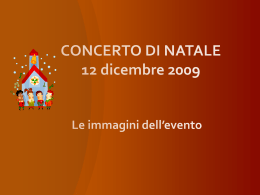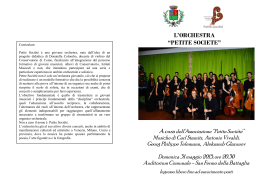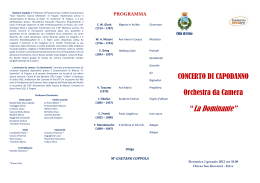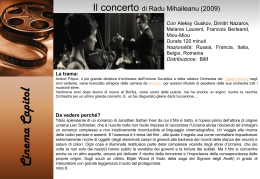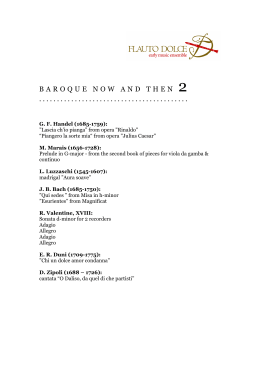Пётр Илъйч Чайковский
P e t e r T c h a i k ov s k y
(1840 – 1893)
Vol. 1 :
op.1/1 Scherzo, op.1/2 Impromptu,
op.2/1 Ruinen eines Schlosseso, op.2/2 Scherzo,
op.2/3 Lied ohne Worte, op.3 Valse, op.5 Romanze,
op.7 Valse-Scherzo, op.8 Capriccio,
op.9/1 Träume, op.9/2 Polka de Salon, op.9/3 Mazurka de Salon
Vol. 2 :
op.10/1 Nocturne, op.10/2 Humoresque,
op.19/1 Abendträume, op.19/2 Scherzo humoristique,
op.19/3 Albumblatt, op.19/4 Nocturne, op.19/5 Capriccioso,
op.19/6 Variationen, op.21/1 Prelude, op.21/2 Fuga,
op.21/3 Impromptu, op.21/4 Marche funebre, op.21/5 Mazurka,
op.21/6 Scherzo, Impromptu in As, Aveu Passone, Militärmarsch
Vol.
Vol.
Vol.
Vol.
3
4
5
6
:
:
:
:
op.37 Grande Sonata, op.80 Sonata 1865
op.37b The Seasons, op.39 Children's album
op.40 12 mittelschwere Stücke
op.72 18 Stücke
Complete Works for
Pianoforte solo
Original settings
Vol.1 : Piano pieces
Y
a a
% $ % $
Y
&
e
e
$
$
e
6
$ $ 1867
Allegro moderato
Scherzo
à la russé
op.1 No.1
Allegro rfurioso
Impromptu
op.1 No.2
$
$ $ $ $ $
3
Remembrance of Hapsal op.2
Ruines of a
castle
op.2 No.1
Scherzo
op.2 No.2
Song without
words
op.2 No.3
Adagio misterioso
&
;
$ a
Allegro vivo
:
$
1867
e
e
e
e
e
e
Y
%
e
e
e
Y
$
$
e
& &
24
1867
28
&
e
e
%
e
e
e
&
& &
:
Y
Y
Y
& &
% &
e
e
e
37
1868
A tempo rubato non troppo mosso
Valse
op.4
15
1867
a
e
%
%
1867
&
&
: cantabile
Allegretto grazioso e cantabile
a
&
$ :
$
e
4
a
e
e
e
r
$ $ $ $
$$
&
Page
Y
41
Vol. 1
Romance
op.5
$$ $$ :
$ $
$$
Page
a
% % $ $
%
Andante cantabile
dolce
%
1868
%
1870
ValseScherzo
op.7
&&
&
:
& & & Cappriccio
op.8
#
=
=
6
$
$
$
$ $ $ $
a
e
e
e
$$
6
Trois Morceaux op.9
$
$ $ $ $ $
&
&
Polka
de Salon
op.9 No.2
Mazurka
de Salon
op.9 No.3
:
62
Allegro giusto
70
1870
&
&
f
:f
m.g.
b
a
& &
e
:
e
Allegro moderato
a poco
cresc.
a
$
$ $ & %
$ %
:
$
$
$
e e
Andante capriccioso
Dreams
op.9 No.1
57
b
$
f
: dolce
$
f
e
m.g.
a
Q %
Q
Q
Q
e
78
1870
b
Y
&
Y
85
1870
91
Appendix : Valse - Scherzo No.2
r
&&&
:
Allegro in tempo di Valse
Biography of Tchaikovsky
&
& Y
e
% Y
e
98
104
Work list of Tchaikovsky
106
Comments
111
Vol. 2 : Piano pieces
2 Pieces op.10
t
Y
&
$ e : dolce
$ Andante cantabile
1.Nocturne
op.10 No.1
& a a
6 e e
Page
2.Humoresque
op.10 No.2
6 Pieces op.19
1.Evening dreams
op.19 No.1
2.Scherzo
humoristique
op.19 No.2
$
$ Y
:
molto cantabile
Allegro vivacissimo
a
&
& & % &
e : leggiero
a
&&
e
:
Allegretto semplice
3.Feuillet d'Album
op.19 No.3
4.Nocturne
op.19 No.4
&&&&
e
Andante sentimentale
&
:
e
a
a
& e
Y
Andante espressivo
1871
a
Allegretto scherzando
a
e
Y
Y
a
e e
a
a
a
& e e
Y
$
$
:
8
12
1873
$
$
a
e
e
&
16
1873
24
1873
%
&
Allegretto semplice
5.Capriccioso
op.19 No.5
a
1871
1873
a
&
&
e
'
a
e
Y
a
e
a
a
& e
Y
4
27
1873
30
Thème
Andante non troppo
6.Theme with
Variations
op.19 No.6
$ % $
: espr.
% $
1873
& %
35
Vol. 2
6 Pieces upon one Theme op.21
1.Prélude
op.21 No.1
Allegro moderato
&&
& & &
:
&&&&
'
&
& e
:
Andante
Y
a
e
2.Fuga á 4 voci
op.21 No.2
3.Impromptu
op.21 No.3
r
r
r
&&&& r
'
6
Allegro molto
4.Marche funébre
op.21 No.4
6.Scherzo
op.21 No.6
Y
& %
e
1873
'
e
:
1873
r
r
r
r
&
&
r
a 1873
r
a
% $$$
a
$
$ $ $ %
e % $ %
e
%
:e
e
e
e
$$ $ $ $ $ $
:
a
%
Allegro vivace $ $ %
$ $
:
a
%
% Y $
$
e
52
1873
Tempo di Marcia
Moderato r
Allegro moderato
5.Mazurka
op.21 No.5
Page
54
57
60
1873
%
a
% $
a
Y
%
68
1873
%
$%
75
cresc.
Appendix
Moderato con moto
Impromptu in As
$$
$ $
;
r
Moderato mosso, molto rubato
Aveu Passioné
&
:
r
3
a
Tempo di Marcia. Maestoso
Military march
Comments
$$
r
cresc.
cantabile
%
r
r
86
90
94
98
Vol. 3 : Sonatas op.37, op.80
Grande Sonate op.37
1878
1. Moderato e risoluto
2. Andante non troppo
quasi moderato
Page
c
&
3
&
g
&
Allegro avivace
4. Finale
Sonata 1865 op.posth.80
1. Allegro con fuoco
2. Andante
a
& & %
3
& $$
e e
&&&&
%
e
a
&&
&
:
Allegro vivo
3.Scherzo
4. Allegro vivo
Comments
e
a
%
%
e
a
Y Y Y Y
& & & &
:
& & & & Allegro vivo
a `
2
a
poco
cresc.
3
38
& &
Y
Y
Y
&
&
&
e
e
e
f
a
b
a
2Ya a
&
&
& f &
& e
e
Y
Y
e e
b
e e
&
%
e
2
a
Y
a a
a
$
&
& f
e
Y
%
&
Y
poco
&
marcato
&
:
&&&&
Y
pesante
24
&
f
a
c
6c
&
&
&
Allegro giocoso
3.Scherzo
%
$
& $
&
: cantabile
& &
& &
Y
6Y
&
Y
Y
Y
Y Y Y Y
Y
Y
e
Y
Y
Y
Y
e
Y
Y
&
& &
a
' &
3
47
63
79
84
95
109
Vol. 4 : op.37b - op.39
The Seasons op.37b
Page
Moderato semplice, ma espressico
1.January
At the fireside
&&
&
:
Allegro giusto
2.February
Russian
Carnival
3.March
Song of the
skylark
& & $
2
$
$
$
Allegretto con moto ed un poco rubato
4.April
Snowdrop
5.May
May nights
6.June
Barcarolle
7.July : The song
of the Reaper
8.August
Harvesting
Scherzo
a
$
$
:
dolce
poco cresc.
a
Andante cantabile
&
& &
:
Allegro vivace
a
% &
b
b
&
2
b
b
a
%
a
%
&
Andante doloroso e molto cantabile
10.October
Autumn song
$
:
Y
&&&&
Allegro moderato
11.November
Troika
Sleigh-ride
Tempo di Valse
12.December
Christmas
$ $
$ $
:
Y
&
e
a
%
e
e
6
12
18
20
24
& &
%
% %
28
33
a
a
& %
e
%
a
&
% &
e
a
Allegro moderato con moto
a
$
$ $
2
$
$
$
%
Andantino
& a a a $
Q Q Q Q
:
Allegro non troppo
9.September
The hunt
e
& & %
r
& Y
&
a a a
Andantino espressivo
a
a
&
Y
36
43
48
52
molto rit. a tempo
Q %
58
Vol 4
Children's album op.39
Page
a
&
:
Andante
1.Morning Prayer
2.Winter morning
3. The young
rider
a
a
% &
%
e
Y a
a Y
a
Y a
$
$ $
e
e
Y e
6
e
Allegro
Y
Y
& & Y a $ a
%
: cresc.
Presto
&& $ $
Moderato
4.Mum
&
&
: molto espressivo e dolce
65
66
68
69
&
& e Y & % e Y & % e e e
e
e
e e
;
Moderato
5.March of the
toy soldiers
6.The sick
doll
7.The doll's
funeral
Moderato
$$ W
6 espr.
$
$ $
;
W
&
W
a
Y
e
Y
e
9.The new
doll
Allegro
$$ a a
e
:
Allegro assai
Allegro non troppo
$
6
$
2
Adagio
13.Kamarinskaya
W
W
&
&
$
$
6
a
Y
e
e
e
e
Tempo di Mazurka
Allegro
12.The Peasant
is playing the
Accordion
%
8.Valse
11.Russian
song
W
Adagio
$ $$
10.Mazurka
W
%
73
Y e
:
a
a a
:
e
72
%
Y a
e
6
W
71
Vivace
& &
e
: marcato
74
76
77
79
80
80
Vol. 4
Moderato
Tempo di Polka
b
14.Polka
$
$ 15.Italian
song
&
&
:
:
Moderato assai
16.Old
french
song
17.German
song
Y
Molto moderato
20.Baba-Yaga
The witch
$
$ $ &
e :
&
Presto
:
Moderato
21.Sweet
dream
Y
e
: grazioso Y
e
&
e
&
=
Y
: molto espressivo
Y
e
83
84
a
$ & Y
$
&
=
85
86
sempre staccato la mano sinistra
% Y
$
=
82
Molto moderato
$$ b
$
e
6
Moderato
19.Nanny tells
a story
e
$
$ a
: con espressione
Andante
18.Neapolitan
song
b
% $ b & % b b
%
:
Page
Y
=
88
90
92
&
r
r
r
r
r
r:
r
Moderato
22.Song of the
skylark
Andante
23.Organgrinder's song
&
:
&
&
:
Moderato
24.In the
church
&
%
a
Y
6
a
&
94
96
97
Photo of P.Tchaikovsky
98
Comments
99
Vol. 5 : Piano pieces
12 Pieces of average difficulty op.40
Allegro giusto
1878
Y
1. Etude
Page
Y
&
& % Y % Y Y
& % Y %
&
Y & Y
2
&
Allegro non troppo
2.Chanson triste
Tempo di marcia funebre
3.Marche funèbre
4.Mazurka
5.Mazurka
Y
%
$
$ $
:
:
7.In the village
Tempo di mazurka
& & Y $ Y
& %
e
e
:
%
&
:
a
a
: espressivo
$ $
$$
:
& &
&
:
%
11.Scherzo
Y
e
r
e
e
Y
e e
Allegro vivacissimo
2
Andante un poco rubato
12.Interrupted
dreams
10
12
Y
a
&
18
23
29
32
%
38
Y
%
44
%
poco cresc.
& : e eY
$
a
a
a
b
e
&
Y
e Y
Andantino
10.Danse russe
Y
%
Tempo di valse
9.Valse
% &
$ &
6
Tempo di valse
8.Valse
& %
Tempo di mazurka
Allegro moderato
6.Song without words
$
$ & $
: la melodia con molto espressione
4
%
$
$ $ $ QQ %
6
Q
Q %
espr.
Y
e e
a
2
e con molto
Y espressione
Q $ % Q
Q $ Q %
2
&
e eY
Y
e e
50
54
Y Y Y
%
e e
: e
62
6 Pieces op.51
1882
1.Valse de salon
Vol. 5
Allegro R.=88
$$
1
$ $ %
:
Y
a
%
a
5
4
2
Allegro moderato
2.Polka pour danse
3.Menuetto
scherzoso
& &
:
Y
$$ $
6
Moderato
4.Natha-Valse
5.Romance
$
a Y
$ $
$
Andante cantabile
: dolcissimo
6.Valse
sentimentale
Doumka op.59
Russian
rustic
Scene
Appendix
Comments
a a
a
$
e
a
a
a
$
$ $ $ %
con espressione e dolcezza
:
Andantino cantabile
$
$ $
:
Valse op.40 No.9
1.Version
&&
&
Nathalie-Valse
op.51 No.4
1.Version
&
``
`
Tempo di Valse
Page
$
a
e
Y
a
%
Tempo di valse
e
Y
%
r
r
W W
%
Y Y
a
:
Q
a
e
% %
&
&
M oderato assai R = 50
&&
&
: dolce
Y
%
5
3
2
Q
&
66
77
84
Y
e
91
97
a
$ $
:
104
1886
W W
Q
109
1876
122
1878
Y
e
e
:
: con molto sentimento pensando a Piero
123
125
Vol. 6 : op.72
18 Pieces op.72
Page
Allegro moderato e giocoso F = 126
1.Impromptu
op.78 No.1
2.Wiegenlied
op.78 No.2
3.Tender
reproaches
op.78 No.2
4.Danse
caractéristique
op.78 No.4
X X
X X
$
%
%
%
$
$ $ $ %
e
e e
e e
6
poco cresc.
cantabile
W
Andante mosso F = 76
:
W
$$ $ $
%
%
W
W
Y Y
Y
;Y Y
Allegro non tanto ed agitato F = 116
& & & W Y W
& e
: molto espressivo e
&
&
Allegro giusto F = 138
Andante mosso
5.Méditation
op.78 No.5
6.Mazurka
pour danser
op.78 No.6
&& a
Q
: ecantabile
$ Y a a
$
2 con anima
Tempo di Mazurka
Y
W
& W
Y W
e
3
e
a
&
e
7.Polka
de concert
pesante ? quasi cadenza,
ad libitum a
$ a ?
$ $
3
8.Dialog
&&
& & & 9.Un poco di
Schumann
F
a
$$ $ $ $
6e
f
Allegro moderato F = 120
Vivace assai R.=96
10.ScherzoFantasy
11
e e
21
Y
e
Y
a
&
29
Y
a Y a a
e
e
e
e
34
a ?
?
?
41
a
W
6 quasi parlando
Moderato
mosso
Moderato
mosso
YF = 100
a
%
Y
4
16
a
e
e
Y
a Y a a
e
e
Tempo di Polacca
%
a
a
W
W Y W Y e
Y
e
e
1893
cresc.
a % % Y
:
a
Y
%
e
:
6
a
a
%
$$ $ $ % $
$ $ f e % e
e
e
51
55
58
Vol 6
Tempo di Valse
11.Valse-bluette
12.Naughty child
13.Echo rustique
14.Elegie
$
$ $
6
e e
e
e
Allegro moderato F = 112
& &&
W
Y
& W
Y W W &
e
e
Y
6 con grazia, in modo di scherzo
Allegro non troppo F = 120
$
$ $ ! ]
W
] ]
Adagio F = 69
a
a a
a
Q Q % $
$ $ $ $ Wa
:
cantando quanto possibile
Q
!
]
e
] ]
Q
W
W
W
e
! !
! ! %
r
r
r
Page
79
84
88
93
Tempo di Mazurka
15.Un poco Chopin
16.Waltz à
5 Tempi
17.A long
time
ago
18.Scène dansante
(Trèpak)
Comments
&&
& & g
6
dim.
Vivace
a
F.F =58
& &
e
:
e
a
e
M oderato assai quasi andante F = 84
a
e
cantabile, con noblezza ed intimo sentimento
$
$ $
:
Allegro non tanto
Y F = 132
Y Y
a
2
101
a
marcato
e
Ya
a
e
107
W W W
più 2
111
115
Ya
123
Biography of Peter Tchaikovsky
Tchaikovsky was born in Kamsko-Votkinsk, 7 May 1840; hier died in St. Petersburg, 6 November 1893).
His father was a mine inspector. He started piano studies at five and soon showed remarkable gifts; his childhood
was also affected by an abnormal sensitivity. The Tchaikovsky family moved to St. Petersburg in 1850, and Peter
llyich was then placed under a good teacher, Filipov, with whom he made rapid but not phenomenal progress.
At ten he was sent to the School of Jurisprudence at St. Petersburg.
His parting from his mother was painful; further, she died when he was 14 - an event that may have stimulated him
to compose.
At the School of Jurisprudence Tchaikovsky joined the choral class given by the famous choir director Lomakin and
continued his piano lessons under Kundinger; but neither of these musicians seems to have suspected a budding
genius. The whole of this period of his life was distinctly inimical to his artistic development; he appears to have
simply acquiesced in the commonplace ideas of the majority, and on leaving the school entered upon a somewhat
frivolous and worldly life. Music was the highest of his pleasures, but his dealings with it were not very lofty; at
twenty he improvised pleasantly and composed waltzes and polkas which he did not venture to put on paper. After a
time, however, he saw with disgust the emptiness of his daily existence. With this moral awakening came also the
first suspicion that he had chosen the wrong career.
At 19 he took a post at the Ministry of Justice, where he remained for four years despite a long joumey to western
Europe and increasing involvement in music.
In 1863 he entered the Conservatory, also undertaking private teaching. Tchaikovsky completed his course at the
Conservatory in 1865. For his diploma work (a setting of Schiller's "Ode to Joy'') he received a silver medal and a
good deal of unflattering criticism. Early in 1866 Nicolai Rubinstein organized the Conservatory in Moscow and
offered Tchaikovsky the post of professor of harmony.
Three years later he moved to Moscow with a professorship of harmony at the new conservatory. During the first
years of his career in Moscow Tchaikovsky lived with Nicholas Rubinstein, a man of somewhat irritable and
overbearing temper, but a loyal and devoted friend. Whether Rubinstein's masterful guidance did not check the free
development of Tschaikovsky's character and talent is an open question, though it was an inestimable advantage to
have such an influential friend; year by year, Rubinstein introduced Tchaikovsky's compositions - even the earliest
ones - at the concerts of the Russian Musical Society, which he conducted.
In the course of his first two years in Moscow Tchaikovsky completed three works, each of importance in its
different style: a "Festival Overture on the Danish National Hymn", his first Symphony in G minor "Winter
Daydreams'' and an opera to a libretto by Ostrovsky "The Voyevoda''.
About Easter 1868, while on a visit to St. Petersburg, Tchaikovsky first came into contact with that group of young
musicians who were working for the cause of nationalism in art. There is no doubt that he was stirred by the
enthusiasm of Balakirev, Rimsky-Korsakov and their supporter Vladimir Stassov, and that they exercised a
temporary influence upon his choice of musical subjects.
Little of his music so far had pleased the conservative musical establishment or the more nationalist group, but his
First Symphony had a good public reception when heard in Moscow in 1868.
Rather less successful was his first opera, The Voyevoda, given at the Bol'shoy in Moscow in 1869; Tchaikovsky
later abandoned it and re-used material from it in his next, The Oprichnik. A severe critic was Balakirev, who
suggested that he write a work on Romeo and Juliet: this was the Fantasy-Overture, several times rewritten to meet
Balakirev's criticisms; Tchaikovsky's tendency to juxtapose blocks of material rather than provide organic transitions
serves better in this programmatic piece than in a symphony as each theme stands for a character in the drama. Its
expressive, well-defined themes and their vigorous treatment produced the first of his works in the regular repertory.
The Oprichnik won some success at St. Petersburg in 1874, by when Tchaikovsky had won acclaim with his Second
Symphony (which incorporates Ukrainian folktunes); he had also composed two string quartets (the first the source
of the famous Andante cantabile), most of his next opera, Vakula the Smith, and of his First Piano Concerto, where
contrasts of the heroic and the lyrical, between soloist and orchestra, clearly fired him. Originally intended for
Nikolay Rubinstein, the head of Moscow Conservatory, who had much encouraged Tchaikovsky, it was dedicated to
Hans von Bülow (who gave its premiere, in Boston) when Rubinstein rejected it as ilI-composed and unplayable (he
later recanted and became a distinguished interpreter of it).
In 1875 came the carefully written Third Symphony and Swan Lake, commissioned by Moscow Opera. The next
year a journey west took in Bizet's Carmen in Paris, a cure at Vichy and the first complete Ring at Bayreuth;
although deeply depressed when he reached home - he could not accept his homosexuality - he wrote the fantasia
Francesca da Rimini and (an escape info the 18th century) the Rococo Vanations for cello and orchestra. Vakula,
which had won a competition, had its premiere that autumn. At the end of the year he was contacted by a wealthy
widow, Nadezhda von Meck, who admired his music and was eager to give him financial security; they
corresponded intimately for 14 years but never met.
Tchaikovsky, however, saw marriage as a possible solution to his sexual problems; and when contacted by a young
woman who admired his music he offered (after first rejecting her) immediate marriage. It was a disaster: he escaped
from her almost at once, in a state of nervous collapse, attempted suicide and went abroad. This was however the
time of two of his greatest works, the Fourth Symphony and Eugene Onegin. The symphony embodies a 'fate' motif
that recurs at various points, clarifying the structure; the first movement is one of Tchaikovsky's most individual with
its hesitant, melancholy waltz-like main theme and its ingenious and appealing combination of this with the
secondary ideas; there is a lyrical, intermezzo-like second movement and an ingenious third in which pizzicato
strings play a main role, while the finale is impassioned if loose and melodramatic, with a folk theme pressed into
service as second subject. Eugene Onegin, after Pushkin, tells of a girl's rejected approach to a man who fascinates
her (the parallel with Tchaikovsky's situation is obvious) and his later remorse: the heroine Tatyana is warmly and
appealingly drawn, and Onegin's hauteur is deftly conveyed too, all against a rural Russian setting which
incorporates spectacular ball scenes, an ironic background to the private tragedies. The brilliant Violin Concerto also
comes from the late 1870s.
The period 1878-84, however, represents a creative trough. The year 1880 marks a distinct increase in
Tchaikovsky's popularity as a composer. He had now reached his fourtieth year, and thanks to Nicholas Rubinstein
all his principal orchestral works had received the best possible interpretations at the concerts of the Musical Society
in Moscow, while his operas had all been given in both capitals. His reputation was therefore well established in
Russia, but so far he had had dubious success abroad. In Vienna he was still the object of Hanslick's almost
venomous hostility, in Berlin the press had unanimously condemned Francesca da Rimini in Paris Romeo and Juliet'
and The Tempest had proved failures and, as recently as January 1880, the Fourth Symphony had been received with
"icy coldness'' at the Colonne concerts. This was a discouraging record, even if it is borne in mind that in England
and the USA his music had met with a far more cordial reception. Now, however, came news of the success of his
third string Quartet op.30, and of the Serenade' for violin and piano at the Société de Sainte Cecile in Paris, of the
excellent reception of the first Suite in America and of the triumph of the B flat minor Piano Concerto, which had
been played by Below and by Friedenthal in Berlin, by Breitner in Budapest and by Rummel in New York.
Tchaikovsky now stood on the brink of universal fame and recognition.
From November 1880 till September 1881 he composed nothing. In the spring of 1881 he was deeply affected by the
death of Nicholas Rubinstein. He was now confronted with the question whether he could fill his friend's place as
director of the Moscow Conservatory. He decided in favour of freedom and his creative work, yet, wise as the
decision was, it cost him some pangs of conscience and so disturbed his peace of mind that he felt no inclination to
embark upon an important composition. He resigned from the conservatory and, tortured by his sexuality, could
produce no music of real emotional force (the Piano Trio, written on Rubinstein's death, is a single exception). He
spent some time abroad. But in 1884, stimulated by Balakirev, he produced his Manfred symphony, after Byron. He
continued to travel widely, and conduct; and he was much honoured. In 1888 the Fifth Symphony, similar in plan to
the Fourth (though the motto theme is heard in each movement), was finished. A note of hysteria in the finale was
recognized by Tchaikovsky himself. The next three years saw the composition of two ballets, the finely characterized
Sleeping Beauty and the more decorative Nutcracker, and the opera The Queen of Spades, with its ingenious
atmospheric use of Rococo music (it is set in Catherine the Great's Russia) within a work of high emotional tension.
Its theatrical qualities ensured its success when given at St. Petersburg in late 1890. The next year Tchaikovsky
visited the USA; in 1892 he heard Mahler conduct Eugene Onegin at Hamburg. In 1893 he worked on his Sixth
Symphony, to a plan - the first movement was to be concerned with activity and passion; the second, love; the third,
disappointment; and the finale, death. It is a profoundly pessimistic work, formally unorthodox, with the finale
haunted by descending melodic ideas clothed in anguished harmonies. It was performed on 28 October.
He died nine days later: traditionally, and officially, of cholera, but recently verbal evidence has been put forward
that he underwent a 'trial' from a court of honour from his old school regarding his sexual behaviour and it was
decreed that he commit suicide. Which version is true must remain uncertain.
Work index of Peter Tchaikovsky
(1840 -1893)
Stage works
opus
Opera
1. The Opritschnik ("The bodyguard")
2. Wakula the blacksmith
3. Eugen Onegin
4. The virgin of Orleans
5. Mazeppa
6. The magician wife
7. Pique Dame
8. Jolanthe
Ballet
1. Swan lake
2. The Sleeping Beauty
3. The Nutcracker
Year
68
69
1870-72
1874
1877/78
1878/79
1881-83
1885-87
1890
1891
Opera in 4 acts after Lashetschnikow
Opera in 3 acts after Gogol
Opera in 3 acts after Puschkin
Opera in 4 acts after Schiller
Opera in 3 acts after Puschkin
Opera in 4 acts after I.W.Schpashinski
Opera in 3 acts after Puschkin
Opera in one act after Hertz
20
66
71
1875/76
1890
1892
Ballet in 4 acts
Ballet in 3 acts after Ch.Perrault
Ballet in 2 acts after E.T.A.Hoffmann
1863/64
1863/64
1863/64
1863/64
for small Orchestra
for String orchestra
for small orchestra
for small orchestra
for big orchestra
about the danish National hymne
corrected 1874
Ouverture about Ostrowski’s drama
Symphonic poem
Fantasy-Ouverture after Shakespeare, 1870 and 1880
reworked 1879
Fantasy after Shakespeare
61
64
67
posth.78
74
1866
1866
1868
1866/67
1868
1869
1872
1873
1875
1876
1876/77
1876/77
1878/79
1880
1880
1880
1883
1884
1883
1884
1885
1885
1887
1888
1888
1891
1893
23
26
33
34
35
44
56
62
posth.75
posth.79
1863/64
1874/75
1875
1876/77
1878
1878
1879/80
1884
1887
1893
1893
for 2 Flutes and String orchestra
24
Orchestra works
Symphonies and other Orchestra works
1. Allegro vivo E-major
2. Allegro ma non tanto G-major
3. Andante ma non troppo/Allegro moderato
4. Agitatio/Allegro c-minor
5.Concertouverture c-minor
6.Ouverture F-major
7. Danish Ouverture D-major
8. Symphonie No.1 g-minor
9. The thanderstorm e-minor
10. Fatum c-minor
11. Romeo and Julia
12. Symphonie No.2 c-minor
13. The Storm f-minor
14. Symphonie No.3 D-major
15. Slavic March bb-minor
16. Francesca da Rimini e-minor
17. Symphonie No.4 f-minor
18. Suite No.1 d-minor
19. Capriccio Italien A-major
20. Serenada C-major
21. Ouverture solennelle Eb-major
22. Suite No.2 C-major
23. Suite No.3 G-major
24. The Coronation march D-major
25. Elegie G-major
26. Manfred b-minor
27. The Lawyer march D-major
28. Suite No.4 G-major
29. Symphonie No.5 e-minor
30. Hamlet f-minor
31. The Wojewode a-minor
32. Symphonie No.6 b-minor
15
13
posth.76
posth.77
17
18
29
13
32
36
43
45
48
49
53
55
58
Fantasy after Dante
for String orchestra
Festival ouverture
"Suite charactéristique"
In memoriam I.W.Ssamarin
Symphonie in 4 pictures after Byron
"Mozartiana"
Fantasy-Ouverture after Shakespeare
Symphonic Ballad
"Pathétique"
Works for Solo instrument and orchestra
1. Concert piece D-major
2. Piano concert No.1 b-minor
3. Melancholic Serenada b-minor
4. Rokoko-Variations A-major
5. Valse-Scherzo C-major
6. Violin concert D-major
7. Piano concert No.2 G-major
8. Concert fantasy G-major
9. Pezzo capriccioso b-minor
10. Piano concert No.3 Eb-major
11. Andante and Finale Bb-major/Eb-major
for Violine and orchestra
for Violoncello and orchestra
for Violine and orchestra
corrected 1893
for Piano and orchestra,
for Violoncello and orchestra
for Piano and orchestra, instrumented by S.Tanejew
Orchestra works
Suite
1. Suite from Ballet "The Swan lake"
2. Suite from Ballet "The Nutcracker"
opus
Year
20
71a
1876
1892
Chember music
1. Adagio F-major
2. Allegro c-minor
3. Adagio molto Eb-major
4. Allegro vivace Bb-major
5. Andante molto G-major
6. Andante ma non troppo e-minor
7. Allegretto E-major
8. Adagio C-major
9. Allegretto D-major
10. String quartet Bb-major
11. String quartet No.1 D-major
12. Serenade to Named day of N.G.
Rubinstein D-major
13. String quartett No.2 F-major
14. String quartett No.3 eb-minor
15. Three pieces
22
30
42
1874
1876
1878
16. Piano trio a-minor
17. Sextet d-minor
50
70
1881/82
1890
1
1863-67
11
1863/64
1863/64
1863/64
1863/64
1863/64
1863/64
1863/64
1863/64
1863/64
1865
1871
1872
for Wind player octet
for Piano sextet
for Stringquartet and Harp
for String quartet
for String quartett
for String quartet
for String quartet
for Wind player quartet
for String trio
in one Set
for Flute, 2 Clarinet, Horn, Fagot and String quartet
"Souvenir d'un lieu cher"-for Violine and Piano, from
A.Glasunow orchestred
"A la mèmoire d'un grand artiste"
"Souvenir de Florence", String sextett, corrected 1891/92
Piano works
Piano for 2 Hands
1. Two pieces
2. Theme and Variationes a-minor
1863/64
3. Souvenir de Hapsal
2
1867
4. Valse-Caprice D-major
4
1868
5. Romance f-minor
5
1868
6. Valse-Scherzo A-major
7
1870
7. Capriccio Gb-major
8
1870
8. Three pieces
9
1870
9. Two pieces
10
1871
10. Six pieces
19
1783
11. Six pieces about a Theme
21
1873
12. Grande Sonata G-major
37
1878
13. The Seasons
37a,b
14. March "Voluntary Fleet" C-major
1875/76
15. Chilldren’s album
39
1878
16. Twelfe pieces
40
1878
17. Six pieces
51
1882
18. Impromptu-Caprice G-major
19. Dumka c-minor
59
1886
1889
21. Impromptu Ab-major
1889
22. Aveu passionné e-minor
1891
23. Military march Bb-major
1893
72
25. Not the blow the branch shakes
26. Sonata c sharp minor
1892
1893
posth.80
1865
Piano for 4 Hands
1. Fifteen russian Folk songs
24 easy pieces
1884
20. Waltz-Scherzo A-major
24. Eighteen pieces
Twelfe Characterisic pieces (orchestered by Alexander Gauk)
1878
1868/69
Ucrainic village szene
Tchaikovsky ?
Orchestra works
Suite
1. Suite from Ballet "The Swan lake"
2. Suite from Ballet "The Nutcracker"
opus
Year
20
71a
1876
1892
Chember music
1. Adagio F-major
2. Allegro c-minor
3. Adagio molto Eb-major
4. Allegro vivace Bb-major
5. Andante molto G-major
6. Andante ma non troppo e-minor
7. Allegretto E-major
8. Adagio C-major
9. Allegretto D-major
10. String quartet Bb-major
11. String quartet No.1 D-major
12. Serenade to Named day of N.G.
Rubinstein D-major
13. String quartett No.2 F-major
14. String quartett No.3 eb-minor
15. Three pieces
22
30
42
1874
1876
1878
16. Piano trio a-minor
17. Sextet d-minor
50
70
1881/82
1890
1
1863-67
11
1863/64
1863/64
1863/64
1863/64
1863/64
1863/64
1863/64
1863/64
1863/64
1865
1871
1872
for Wind player octet
for Piano sextet
for Stringquartet and Harp
for String quartet
for String quartett
for String quartet
for String quartet
for Wind player quartet
for String trio
in one Set
for Flute, 2 Clarinet, Horn, Fagot and String quartet
"Souvenir d'un lieu cher"-for Violine and Piano, from
A.Glasunow orchestred
"A la mèmoire d'un grand artiste"
"Souvenir de Florence", String sextett, corrected 1891/92
Piano works
Piano for 2 Hands
1. Two pieces
2. Theme and Variationes a-minor
1863/64
3. Souvenir de Hapsal
2
1867
4. Valse-Caprice D-major
4
1868
5. Romance f-minor
5
1868
6. Valse-Scherzo A-major
7
1870
7. Capriccio Gb-major
8
1870
8. Three pieces
9
1870
9. Two pieces
10
1871
10. Six pieces
19
1783
11. Six pieces about a Theme
21
1873
12. Grande Sonata G-major
37
1878
13. The Seasons
37a
14. March "Voluntary Fleet" C-major
1875/76
15. Chilldren’s album
39
1878
16. Twelfe pieces
40
1878
17. Six pieces
51
1882
18. Impromptu-Caprice G-major
19. Dumka c-minor
59
1886
1889
21. Impromptu Ab-major
1889
22. Aveu passionné e-minor
1891
23. Military march Bb-major
1893
72
25. Not the blow the branch shakes
26. Sonata c sharp minor
1892
1893
posth.80
1865
Piano for 4 Hands
1. Fifteen russian Folk songs
24 easy pieces
1884
20. Waltz-Scherzo A-major
24. Eighteen pieces
Twelfe Characterisic pieces (orchestered by Alexander Gauk)
1878
1868/69
Ucrainic village szene
Tchaikovsky ?
Vocal instrumented works
opus
Year
Songs and/or Chor and orchestra
1. To the comming sleeping c-minor
2. To joy
3. Cantata
1863/64
1865
1872
4. Cantata
5. Moscow – Corronations Cantata
1875
1883
for mixed Chor and orchestra
Cantata for Solo voice, Chor and orchestra after Schiller
for Tenor, mixed Chor and orchestra, in memoriam to the
200. birthday of Zar Peter the Big
for Tenor, mixed Chor and orchestra after Nekrassow
for Mezzosopran, Bariton, mixed Chor and orchestra after
Maikow
Songs
1. My Genius, my Angel, my Friend
2. Semphiras `song
3. Six Romances
4. Forget so fast
5. Six Romances
6. Take my hard
7. Six Romances
8. Six Romances
9. Six Romances
10. Song „Ich wollt', meine Schmerzen
ergössen sich“
11. Not longer
12. Six Romances
13. Six Duette
14. Seven Romances
15. Romeo and Julia
16. Sixteen Children songs
17. Six Romances
18. Twelfe Romances
19. Six Romances
20. Six Songs
21. Six Romances
22. The night
6
16
25
27
28
38
46
47
54
57
60
63
65
73
vor 1860
1860 ?
1869
1870
1875
1873
1875
1875
1875
1875
Fet
Puschkin
Apuchtin
Fet
Mey after Heine
1875
1878
Grekow
1881-93
1883
1883
1886
1887
1888
1893
1893
Szene with Duet, instrumented by S.Tanejew
with french text
with german text
after dem Andantino from Piano fantasy c-minor KV from
W.A.Mozart, for Sopran, Old, Tenor, Basso and Piano
Vocal works
1. To the comming sleeping c-minor
2. Chor to 50.Year of the Law scoole
B-major
3. The Angel is cheering G-major
4. The golden cloud was sleeping
f-minor
5. Greeting to A.Rubinstein C-major
6. The Nightingale D-major
7. Not the coucou G-major
8. The Evening G-major
9. Happy is, wo is smiling F-major
10. Why against the happy voices?
B-major
11. Without time e-minor
12. Liturgie the holy Johannes Chrysostomus
13. Night vesper
14. Nine Chirch chorals
15. Hymnus in memoriam of the holy Cyrill
and Methodius F-major
16. Night
41
52
1863/64
1885
for mixed Chor
for mixed Chor
1887
1887
for mixed Chor
for mixed Chor
1889
1889
1891
1881
1887
1891
for mixed Chor
for mixed Chor
for mixed Chor
for 3 voices Mans chor
for 4 voices Mans chor
for Mans chor
1878
1881/82
1884/85
1885
for Womens chor (4 voices)
14 Numbers for mixed Chor
17 Chors for mixed Chor
for mixed Chor (4 voices)
for mixed Chor
1893
after Mozarts Piano fantasy KV 475, for 4 Solo voices
(SATB) with Piano
Drama music
1. Music to drama "The false Dmitri and
Wassili Schuiski" Introduktion and Mazurka
2. Music to drama "The Barber from Sevilla"
3. Music to drama "Snowflake"
4. Music to drama "The Wojewod"
5. Music to drama "Hamlet"
1867
from Ostrowski
12
1872
1873
1886
67a
1891
from Beaumarchais
from n Ostrowski
from Ostrowski, Monolog for blower, Harp and String
orchestra
for small orchestra
Transcriptions
1. The Wojewod
2. The Wojewod
3. The Wojewod
4. Symphonie No.2
5. Romance
6. Piano concert No.1
7. Der Opritschnik
8. Melancholische Serenade
9. Slawischer Marsch
10. Dänische Ouverture
11. Liturgie
12. orchestrasuite No.1
13. Eugen Onegin
14. Piano concert No.2
15. Capriccio Italien
16. Serenade
17. Orchestra suite No.2
18. Mazeppa
19. Children’s song
20. Romance
21. orchestrasuite No.3
22. Moskau
23. Manfred
24. Pezzo capriccioso
25. The magician women
26. Andante cantabile
27. Nocturne
28. Duet
29. Children’s song
30. Pique Dame
31. Jolanthe
32. The Nutcracker
33. Symphonie No.6
34. Piano concert No.3
35. Weber: Menuetto capriccioso
36. Beethoven: Allegro der Violin sonata
37. Beethoven: 1.Set from the Piano sonata
op.13
38. Schumann: Adagio and Allegro brillante
39. Gungl: Le Retour
40. Dubuque: Maria-Dagmar
41. Dubuque: Love remembers
42. Dargomyshski: Kasatschok
43. Auber: Adss to Opera "Le domino noir"
44. Fifty russian folk songs
45. Rubinstein: Iwan the terrible
46. Stradella: O del mio dolce ardor
47. Cimarosa: Terzet from Opera "Il
matrimonio segreto"
48. Rubinstein: Don Quixote
49. Children songs for russian and ucrainic
Melodies
50. Haydn: God save Franz
51. Schumann: Ballad for Heideknaben op.122
52. Liszt: The king of Thule
53. Gaudeamus igitur
54. Mozart: Figaros wedding
55. Dargomyshski: The golden cloud was
sleeping
56. Glinka: Slawsja (Chor from "A life for the
Zar")
57. Laroche: Fantasy-Ouverture
58. Menter: Hungrian gypsy kinds
59. Valse-Scherzo C-major
60. Liszt: Orchestra transcription of the Piano
concert of hungrian kind
opus
3
3
3
17
16 No.5
23
26
31
15
41
43
44
45
48
53
54 No.5
47 No.7
55
58
62
11 No.2
19 No.4
46 No.6
54 No.5
68
69
71
74
75
39 No.2
47
Year
1868
1868
1868
1872
vor 1873
1874
1874
1875
1876
1878
1878
1878
1878
1880
1883
1880
1883
1883
1884
1884
1884
vor 1885
1886
1887
1887
1888 ?
1888
1888
1889
1890
1892
1892
1893
1893
1863
1863/64
1863/64
1863/64
1863/64
1886
1866/67
1867
1868
1869
1869
1870
1870 ?
39
for Voice and Piano
Potpurri for Piano
for Piano for 4 Hands
for Piano for 4 Hands
for Piano
for 2 Pianoe
for Voice and Piano
for Violine and Piano
for Piano
for Piano for 4 Hands
for Piano
for Piano for 4 Hands
for Voice and Piano
for 2 Pianos
for Piano for 4 Hands
for for 4 Hands
for Piano for 4 Hands
for Gesang and Piano
for Gesang and orchestra
for Gesang and orchestra
for Piano for 4 Hands
for Voice and Piano
for Piano for 4 Hands
for Violoncello and Piano
for Voice and Piano
2.Set from String quartet for Violoncello and String
orchestra
for Violoncello and orchestra
for Voice and orchestra
for mixed Chor a cappella
2 settings for Voice and Piano
for Voice and Piano
for Piano (als op.71b )
for Piano for 4 Hands
for 2 Pianoe
(as der Pianosonate) for orchestra
(No.11 and 12 of the Sinfonic Etudes op.13) for orchestra
for orchestra
No.11 and 12 der Sinfonischen Etüden op.13 for orchestra
for orchestra, unfinished
for orchestra
for Piano for 4 Hands
for Piano
for Piano for 4 Hands
for Piano for 4 Hands
for Gesang and orchestra
for orchestra
1871
1872 and
1877
1874 ?
1874
1874
1874
1875
1876
for Piano zu 4 Händen
for Voice and Piano
for orchestra
for Speaker and orchestra
for Voice and orchestra
for Mans chor wit h Piano
Change of any Recitatives
for Voices terzet (STB) and orchestra
1883
for Unisono-Chor and String orchestra
1888
1892/93
1893
1893
from "Marmosina" for Piano and orchestra
for Piano and orchestra
for Violine and Piano
Fragments and lost works
opus
1. Anastasie-Valse
Year
1854
for Piano , loss
2. Mezza notte
1860
song for high voices with italian text, loss
3. Nah dem Flusse, nah der Brücke
1862
for Piano, loss
4. The Romans in Colosseum
1863/64
Drama music, loss
5. Boris Godunow
1863/64
Drama music for a szene after Puschkin, loss
6. Oratorium
1863/64
for Solo voice, mixed Chor and orchestra, loss
7. Allegro f-minor
1863/64
for Piano, Skizzes
8. Character dances
1865
9. A quickly story
1867
as "Dances and Land maid" recieved in the Opera "The
Wojewod", loss
Drama music to P.S.Fedorows, loss
10. The Wojewod
3
1867/68
11. Undine
1869
12. Mandragora
1869/70
13. Natur and Love Gb-major
1870
Opera in 3 acts after Ostrowski, Libretto: Ostrowski and
P.Tschaikowski,
Opera in 3 acts, Libretto: W.Ssollogub, Urperformance of the
Fragments: Moscow 1870, loss, any parts in other
compositions used
Opera after S.A.Ratschinski, survive is "Chor of the flowers
and Insects" for Chor and orchestra
for 2 Sopran, Old, Womens chor and Piano, loss
14. The blu spring-eyes
1873
song after Heine, loss
15. Funeral march to the Opera "The Opritschnic"
1877
for Piano, loss
16. The Fairy
1879
Drama music to a piece of O.Felier, Berceuse and Waltz, loss
17. Montenegro
1880
Music to live pictures, for small orchestra, loss
18. Cantata
1880
for vierstimmigen Frauenchor a cappella
19. Romeo and Julia
1894
20. Concert piece
1883
Opera after Shakespeare, begin of the 1880s, finished by
Sergej Tanejew
for Flute and orchestra, any Themes
21. Sleeping Beauty
1889/90
Suite for orchestra, Skizzes
22. Symphonie Es-major
1891/92
23. Momento lirico (Impromptu) Ab-major
1892/93
unfinished, only first Set is instrumented, Sets 1, 2 and 4
op.75 and op.79, 3.Set Scherzo-Fantasy op.72 No.10 for
Piano, instrumented 1955 by S.Bogatyrijew and as
Symphonie No.7 declared
for Piano, finished by S.Tanejew
24. Spring
1893
Womens chor a cappella, loss
Edited by
Alexej Wilk
© 2005 pdf-Noten Wilk, Berlin
Unauthorised copying of music is forbidden by law, and may result
in criminal or civil action.
Scaricare
